Coronavirus: Fighting food poverty in a lockdown
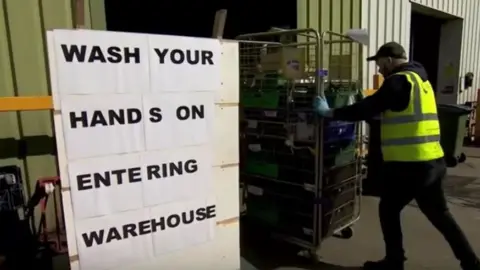 BBC
BBCDriving through deserted streets past shuttered shops and restaurants, it seems, on the face of it, that normal life is on hold.
To help in the war against an invisible foe, most of us are observing the guidelines, staying at home and battling boredom.
But, at FareShare Greater Manchester, there can be no let-up in the fight against food poverty.
"We're busier than ever," said Glynis Platt, one of the charity's long-standing volunteers.
"Demand is increasing, supply is increasing, yet half our staff have had to self-isolate.
"We'd normally have five or six people in this office. Now it's just me and Tony."
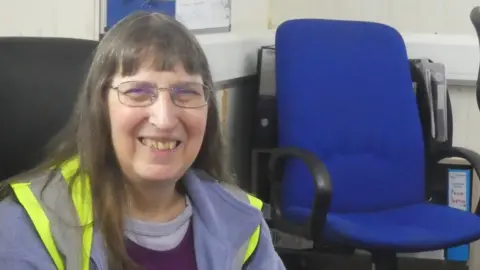
Glynis, 68, has been helping out for eight years since retiring as a university librarian.
Instead of stepping back to protect herself during the virus crisis, she's just upped her hours.
"They tried to suggest that I'd be safer at home," she said.
"But how can I when there are people who can't get out or don't have the money to get food?"
Ready Steady Cook
FareShare operates by taking food waste to help those in need - the homeless, the vulnerable and those struggling to make ends meet. And now, people shielding from the virus.
Donations from food suppliers or supermarkets arrive at its base in New Smithfield Market, Openshaw. What comes in can change by the hour.
Five pallets of gammon steaks were delivered when it was announced the pubs would close. Today there's a surplus of mushrooms, melons and mayonnaise.
Like an industrial version of Ready Steady Cook, Glynis' job is match up the stock with the needs of 200 partners on the food poverty front line - charities, faith groups and food banks.
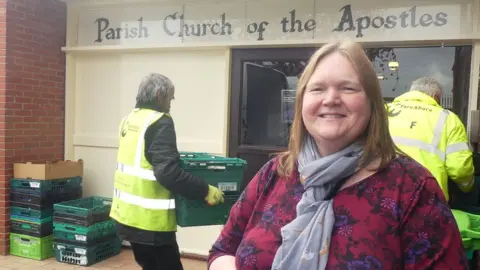
At the Church of the Apostles, the Revd Ellie Trimble is leading the fight to feed those in need in Miles Platting.
As FareShare drivers Duncan and Frank unload boxes of eggs, sausages and fruit juice, she explains how they have had to adapt since the restrictions.
"Normally, we run night shelters for the homeless, but we've had to close them now. With the virus, it's just not the best option for our guests.
"They've all been moved into hostels and hotels. But who's going to feed them?" she said.
Sunday dinners at The Apostles have stopped too but, for Ellie and her team, the work goes on.
They're making 300 hot meals a day and 200 food packages a week sent out as part of the Manchester Community Response - a hub set up to support the city's most vulnerable.
'Absolute lifeline'
The Mustard Tree in Ancoats, another battle-hardened charity, has been helping Manchester's rough sleepers for 25 years.
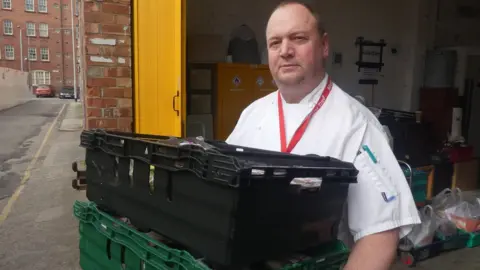
But, because of Covid-19, they have had to scrap free Friday hot meals for the homeless, said food manager Chris Davies.
"Before this, we were serving 2,000 meals a month, or 500 a week.
"Now we have had to go to making 90 food parcels a day. It's completely changed."
Down the road in Audenshaw, St Anne's RC Primary School may be closed for lessons. But the need to feed hungry kids on free school meals has not gone away.
Teaching assistants Lisa Hutchinson and Lindsey Delahunt rely on food from FareShare to run a breakfast club and make up lunch boxes.
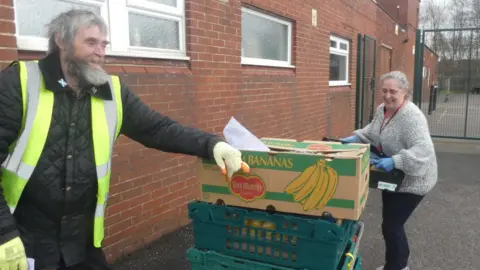
"They are a lifeline, an absolute lifeline. We couldn't do what we do, giving children the food and the fresh fruit they need, without them," said Lisa.
On the plus side, FareShare nationally has seen a surge in offers of help, thanks in part to a recent appeal on Sport Relief.
But just when they need the help most, the threat posed by coronavirus has tied their hands.
The number of people who can be inducted is limited, said volunteer manager Liz Lauder.
"We have to strike a balance between getting food deliveries in and keeping people safe," she explained.
"The warehouse is quite cramped so, keeping two metres apart.. it's difficult."
Pickers and packers
Inside, a select group of pickers and packers are busy making up orders ready to go out the next day.
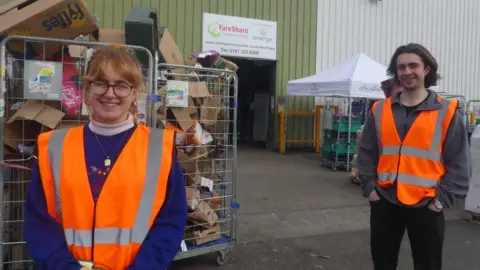
Among them, are final year Geography students Andrew Fowler and Emma Price, both
They both felt that, while they were fit and healthy, volunteering was something they could do.
"I just felt a bit useless [during the outbreak]. Like it was out of my control," said Emma.
"We've got a lot of free time since university shut down so, why not?"
Like many students, Andrew could have gone home to his parents but chose not to.
"I feel that Manchester's my home now," he said.
"And if you know people are going hungry, I think it's right that we stay and do what we can."
